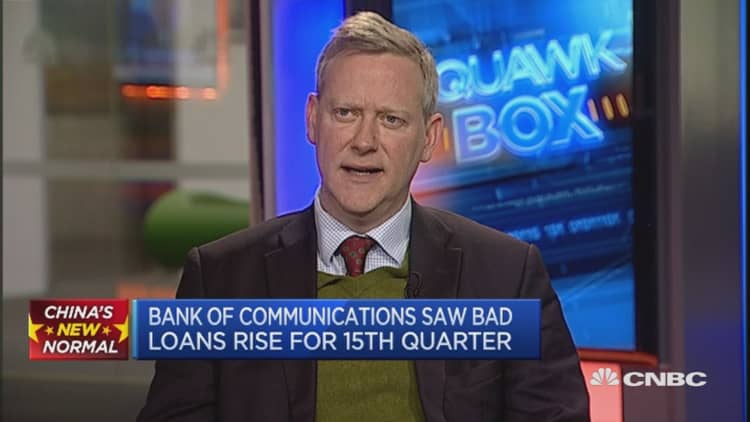A unit of Guosen Securities, China's eighth-largest investment bank, has defaulted on a Hong Kong-traded renminbi bond, according to a document seen by the Financial Times, marking the first debt breach by a state-owned enterprise in China's offshore market in nearly two decades.
The technical default by Guosen's Hong Kong affiliate puts at risk a Rmb38m ($5.9m) coupon payment due April 24 on Rmb1.2bn in "dim sum" bonds sold in 2014. Missing that payment would set a precedent for the offshore units of Chinese SOEs, whose creditors widely assume the onshore parent will always stand behind its affiliates, according to analysts.
The default was unexpected because Guosen's onshore unit is by all appearances in rude health. With the city government of Shenzhen as its largest shareholder, Guosen Securities was 12th in the league table for onshore equity underwriting in 2015, according to Dealogic, down from fourth in 2014.
The Shenzhen-listed brokerage earned net profit of Rmb14.2bn in 2015, up 188 per cent from a year earlier, according to a filing in January. It ranked eighth among mainland brokerages by assets at the end of 2014, according to industry association figures.
Like other Chinese securities companies, Guosen benefited from a surge in stock trading commissions during China's equity market roller coaster last year. But its offshore unit, Guosen Securities (HK) Financial Holdings, has struggled to gain a foothold in Hong Kong's capital markets, where foreign and mainland banks compete on a more level playing field.
A special purpose vehicle owned by Guosen (HK) issued the bonds in April 2014 at an interest rate of 6.4 per cent.

State media reported in 2011 that Guosen HK had doubled its staff in Hong Kong to 200 that year after hiring HSBC veteran Chen Gang to head its investment banking division. The company hoped to help mainland companies looking to tap the Hong Kong capital markets.
The dim sum bond market emerged around 2010 as China moved to encourage international use of its currency. With renminbi accumulating in Hong Kong and other offshore financial hubs, Chinese and foreign issuers took advantage of interest rates typically lower than those available in China's onshore debt market. Last year, offshore renminbi bond issuance slumped to $17bn after hitting a record $33bn in 2014, according to Dealogic. Some $64bn in such bonds is currently outstanding.
More from the Financial Times :
Google's Sundar Pichai handed $100m pay package in 2015
Inside the role of Silicon Valley's start-up CFOs
Native English speakers must learn how they come across
After years in which investors reliably assumed that China's government would not permit any corporate default, missed payments have become more common in both the onshore and offshore bond markets, but SOE defaults remain rare.
Baoding Tianwei, a manufacturer of electric transformers, became the first SOE to default on a domestic bond last April.
In the offshore market, companies including LDK Solar and property developer Kaisa Group have defaulted in recent years, but neither an SOE nor any Chinese financial institution has defaulted since the collapse of Guangdong International Trust and Investment in 1999.
Bank of New York Mellon's Hong Kong branch, which serves as trustee for the bond, warned Guosen's bondholders that a provision of the so-called keepwell deed associated with the Guosen bond "is not in full force and effect, which constitutes an Event of Default", according to the document dated March 23.
Chinese companies have used keepwell structures in offshore bond sales as a way to provide a degree of security to foreign investors. Until mid-2014, China's foreign exchange regulator forbade onshore companies from issuing direct guarantees of offshore debt.
"Keepwell deeds are not guarantees and are subject to much greater legal and regulatory uncertainty than compared to guarantees," Gary Lau, managing director at ratings agency Moody's, warned in 2014.
Most Chinese offshore bonds are issued through tax-haven-domiciled SPVs, leaving investors with little recourse to onshore assets. It was not clear which provision of the keepwell deed, which was agreed by Guosen's onshore parent, had been violated.
Shares in Guosen Securities were up 0.6 per cent in Shenzhen on Thursday.
Guosen Securities (HK) Financial Holdings and Guosen Securities did not immediately respond to a request for comment.


